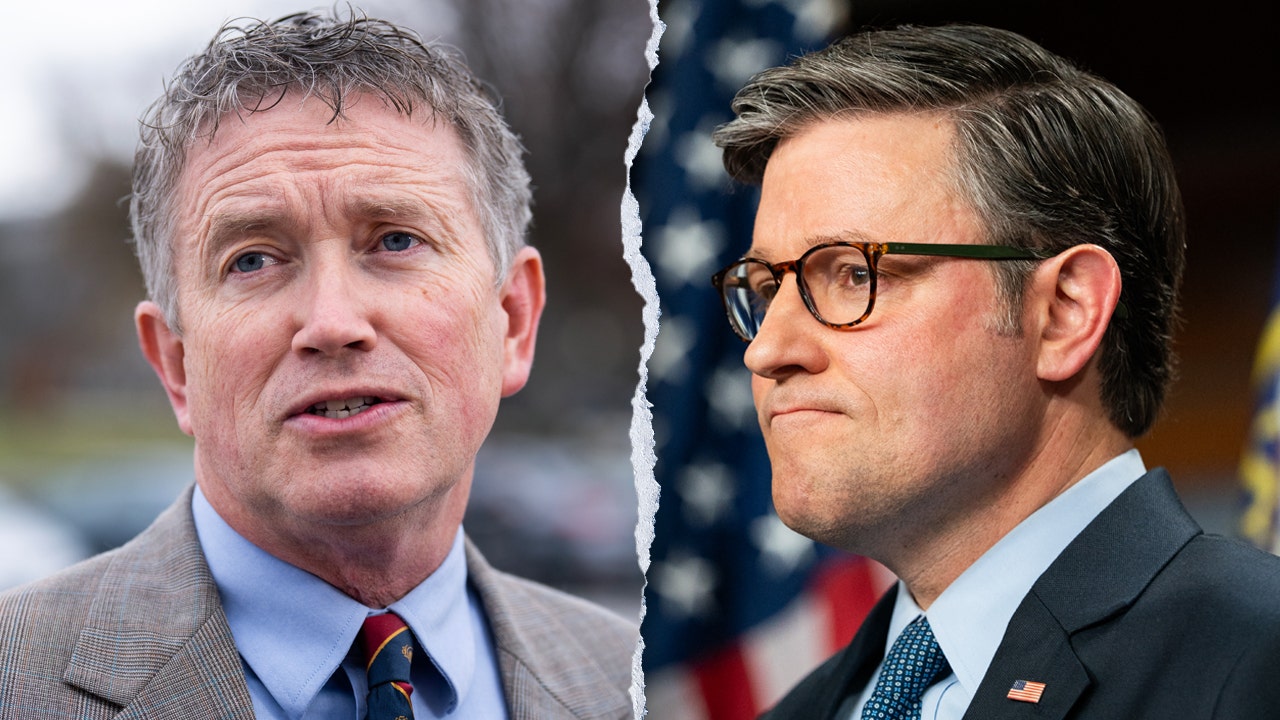World
Is Turkey uniquely positioned to mediate between Palestinians and Israel?
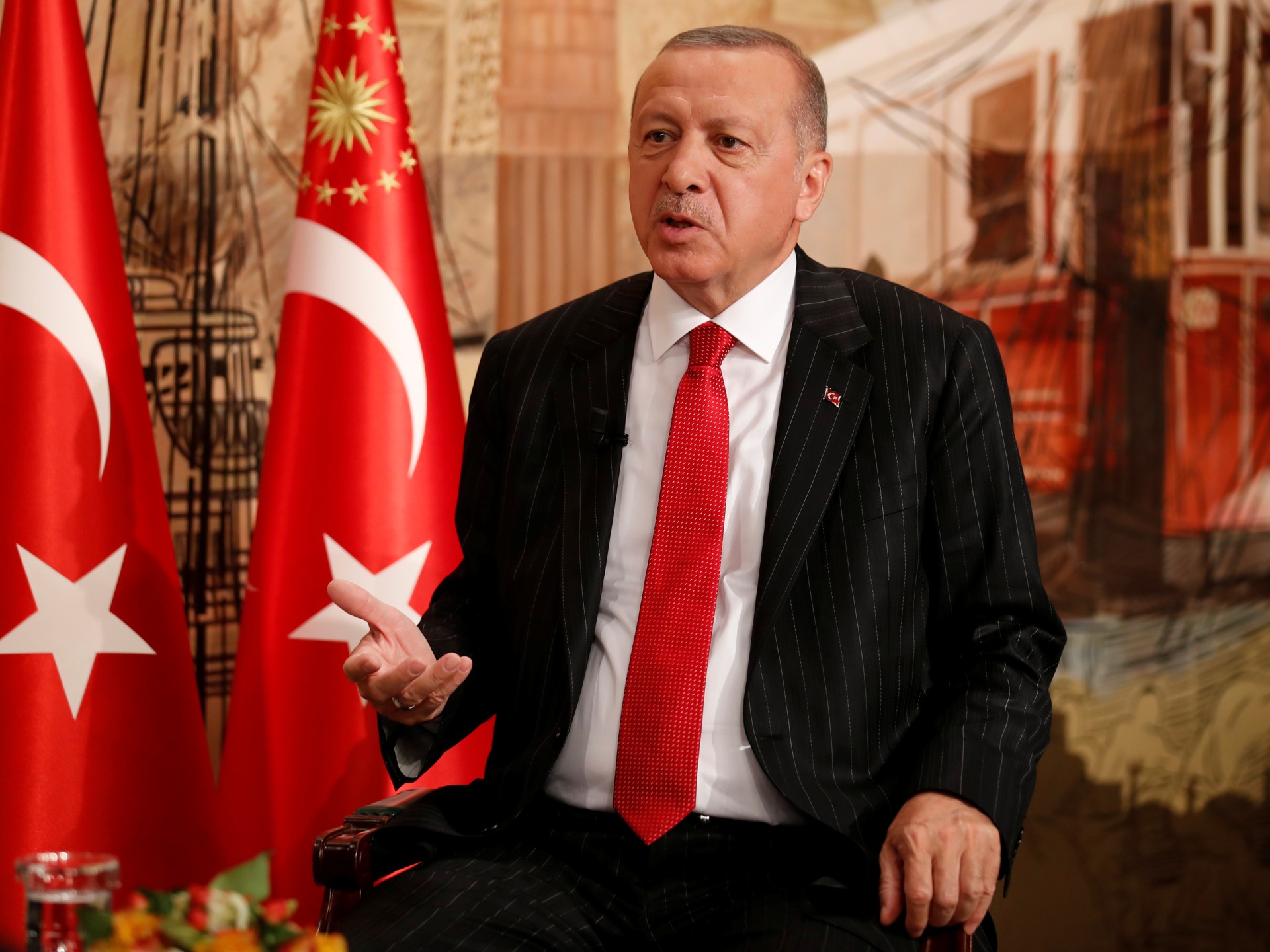
Istanbul, Turkey – The war on Gaza has seen Turkey step forward as a potential mediator to not only end Israel’s bombardment of the Palestinian enclave, but also bring lasting peace to one of the world’s most intractable conflicts.
President Recep Tayyip Erdogan has led his country’s bid, keen to promote Turkey as a global player and replicate Ankara’s success in mediating between Ukraine and its invader, Russia, to strike a deal for Kyiv to export grain.
Hamas’s October 7 attack on Israel and Israel’s retaliatory air raids on Gaza – which have yet to end – came as Ankara and Tel Aviv were fostering warmer ties after more than a decade of hostility.
Ties to both sides
Turkey has relations with Hamas, making it one of the few countries with any influence with the group that has ruled Gaza since 2007.
Ankara did not declare Hamas a “terrorist organisation”, leading Tel Aviv to protest that Turkey-based Hamas members have been involved in planning attacks on Israel.
“Turkey has a good communication channel with Hamas, which is an important asset,” Taha Ozhan, research director at the Ankara Institute, said. “It has been built up over 17 years, when Turkey was the only country to invite Hamas into [its capital].
“In these times of crisis, the communication channels and relations are important,” said Ozhan, a former chair of the Turkish parliament’s foreign affairs committee.
Turkish officials – led by Erdogan and his foreign minister, Hakan Fidan – have acted on this advantage, seeing a central role for Ankara in resolving the latest Gaza conflict.
Their immediate focus has been on getting humanitarian aid to civilians in Gaza and seeking the release of some 200 hostages taken by Hamas.
Speaking in Beirut on Tuesday, Fidan said “a variety of countries” had asked Turkey for help in releasing their citizens.
“We have started discussing … with the political section of Hamas,” he said. “We’ve been putting a lot of effort to make sure that children and foreigners especially are released.”
Support for Palestine
There is wide public support in Turkey for the Palestinian cause, with pro-Palestine demonstrations drawing thousands of Turks in recent days.
At the same time, Turkey had relations with Israel for much of Israel’s history, until things hit a rough patch in 2010.
That year, Israel killed nine Turks who were on board a Freedom Flotilla trying to deliver humanitarian aid to a besieged Gaza Strip, with a tenth dying after years in a coma. Relations were restored in 2016, only to fall apart again in 2018.
That year, Israel passed a law declaring itself the “nation-state of the Jewish people”, drawing criticism from Erdogan. Then the United States moved its embassy in Israel from Tel Aviv to Jerusalem and Israel killed tens of protesters participating in the Great March of Return in Gaza.
This has resulted in Erdogan being held in high regard by Palestinians.
“Erdogan remains lionised in Gaza, the West Bank, and across much of the Arab world, due to his history of using harsh rhetoric to attack Israel’s policies towards the Palestinians,” said Wolfango Piccoli, co-president at political risk advisory group Teneo.
This lionisation survived when Turkey changed gears last year and started a regional rapprochement drive that saw it rebuilding bridges with Egypt, Saudi Arabia, the UAE – and Israel.
‘New methodologies’
Fidan has been meeting leaders across the region, and held phone calls with US Secretary of State Antony Blinken and Hamas chief Ismail Haniyeh.
Ankara, he said, is seeking to “open the door for a permanent and comprehensive peace” based on a two-state solution, and suggested Turkey could act as a guarantor.
“We don’t believe there will be a permanent solution by using the old methodologies, so hopefully in the upcoming meetings we will continue to express our ideas on the use of new methodologies,” he said in a joint news conference with his Lebanese counterpart on Tuesday.
Ozhan says Turkey may be best placed to put forward a political framework that enables discussions on the future of Palestinians. “Unless we ask that question, everything will be temporary or even arbitrary,” he said.
Ferhat Pirincci, international relations professor at Turkey’s Bursa Uludag University, said: “What Turkey has advocated from the very beginning is that many problems, especially frozen conflicts, can be resolved peacefully and therefore a sustainable peace can be established.”
But Turkey’s efforts at a lasting solution could be thwarted without meaningful engagement from both sides.
“Without talking about occupation, without talking about Palestine and Palestinians’ situation, there’s no room to move, it’s just talk,” Ozhan said.
“It depends on if Israel – and the support it has coming from Washington and Europe – are really interested in mediation.”
Warning of a “ripple effect” that could expand the conflict, he added: “The wise choice should be re-establishing a political context and using this crisis as a leverage to create a political framework. But it depends on Israel and it depends on some Western capitals.”

World
EU leaders insist no decisions can be taken about Ukraine without Ukraine, or behind their backs
BRUSSELS (AP) — European Union leaders insisted on Thursday that no decisions can be taken about the future of war-ravaged Ukraine without its consent or behind the backs of its partners in Europe, barely a month before U.S. President-elect Donald Trump takes office.
Ukraine’s position is precarious more than 1,000 days into the war. Russia continues to make gains on the battlefield, pushing the front line gradually westward despite suffering heavy casualties. Ukraine’s energy network is in tatters and military recruits are hard to find.
In a show of solidarity at a summit in Brussels with Ukrainian President Volodymyr Zelenskyy, many EU leaders repeated a variation of what has become a common mantra — nothing about Ukraine without Ukraine, nothing about security in Europe without Europeans.
Trump returns to the White House on Jan. 20 having promised to end the war in Ukraine quickly and talked up his relationship with Russian President Vladimir Putin. Many Europeans are concerned that it might result in a poor deal for Ukraine.
The other big worry is that Putin will just use any interregnum to rearm and cause more strife.
Rumors are swirling in Europe about possible peace talks in early 2025, and whether European peacekeepers might be needed to enforce any settlement, but the leaders are trying to keep a lid on speculation about what they are prepared to do, so as not to tip their hand to Russia.
The priority now, they say, must be to strengthen Ukraine’s hand, should Zelenskyy decide it’s time to negotiate.
German Chancellor Olaf Scholz said that it’s important to “ensure long-term aid to Ukraine – it must be clear that we are prepared to enable support as long as it is needed.” Air defense, artillery and ammunition are high on the list, he told reporters.
Asked about Trump, Scholz said that his impression from talking to the president-elect “is that good cooperation between Europe and the U.S. is possible.” He said that “the principle is always: no decisions over Ukrainians’ heads, and that of course means over those of the European states.”
Luxembourg Prime Minister Luc Frieden had a similar message.
“We need to stand with Ukraine, and every step … needs to be taken with Ukraine and in the presence of the European Union. The future of Ukraine is decided in Europe and not elsewhere,” he said.
Dutch Prime Minister Dick Schoof underlined that Ukraine must be the country that “determines under what conditions talks can possibly take place. And it is not for us to talk about that. At the moment, Ukraine has not yet indicated that they are prepared to do so.”
It’s difficult to predict what Trump might do, and whether history might be a reliable guide.
Under his previous presidency, in 2020, the United States inked a deal on a military withdrawal from Afghanistan directly with the strongest player — the Taliban insurgents —mostly playing down the concerns of the Afghan government and president.
The chaotic exit in 2021, finally ordered by U.S. President Joe Biden, humiliated Washington and its allies in NATO as the Afghan security forces they had trained for years and invested billions in collapsed and the Taliban swept to power.
In Ukraine, the 27-nation EU has provided at least as much support – more than 180 billion euros ($187 billion) since Russia began its full-fledged invasion almost three years ago – as the United States.
But while the world’s biggest trading bloc can probably continue to prop up Ukraine’s ravaged economy, the EU is almost certainly unlikely to be able provide the military backing that the country’s armed forces would require to prevail.
“From the beginning of next year, we need very much unity between the United States and EU, and countries of Europe,” Zelenskyy told reporters at the summit. “Only together the United States and Europe can stop Putin and save Ukraine.”
“It’s very difficult to support Ukraine without American help,” he said.
___
Raf Casert in Brussels, and Geir Moulson in Berlin, contributed to this report.
World
Palestinian Authority under pressure amid rising resistance, popularity of Iran-backed terror groups
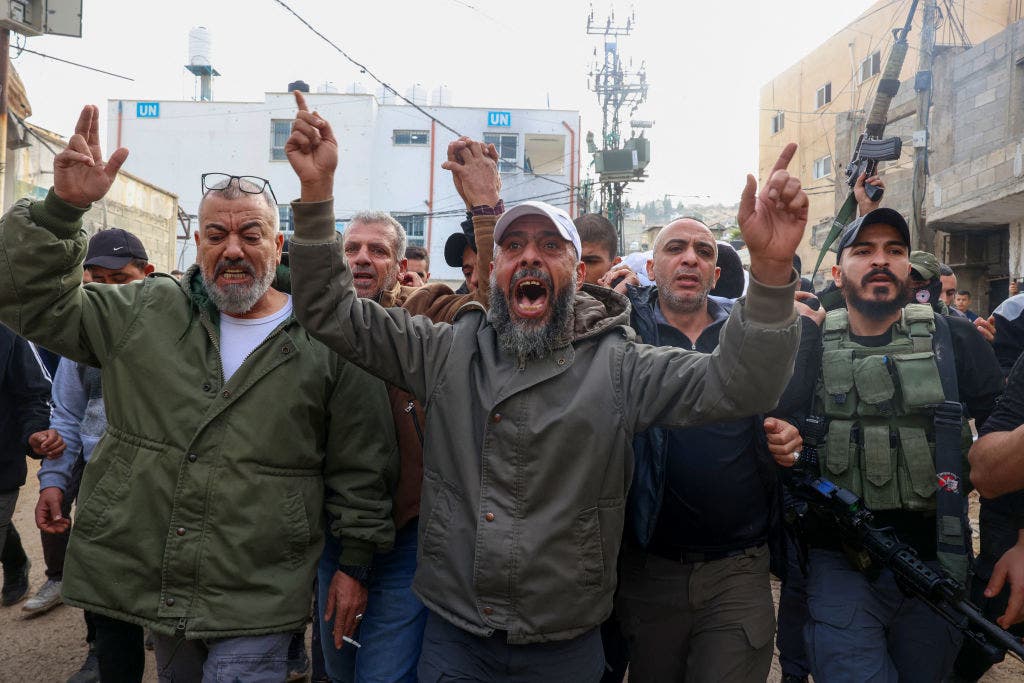
The Palestinian Authority (PA) is facing a growing challenge in the northern West Bank city of Jenin as it launches an ongoing operation against local terror factions supported by Iran, a crackdown that has sparked violent clashes and highlighted the deepening rift between the PA and local communities.
“Iran has been funding militants to buy weapons, and now the Palestinian Authority is acting to stop that. They’ve taken measures to block the money and crack down on the factions. The PA knows Iran will keep supporting Hamas and Islamic Jihad, and this is the challenge they face. It’s the right time to confront Iran, especially after the wars in Gaza and Lebanon- public mood is not welcoming any military confrontation with Israel after what happened,” Mohammad Daraghmeh, Asharq News bureau chief in Ramallah, told Fox News Digital.
The U.S. has reportedly requested Israel’s approval to deliver urgent military assistance to the PA as it intensifies its crackdown on terror organizations in Jenin, Axios reported. The Biden administration is seeking to provide the PA security forces with ammunition, helmets, bulletproof vests, armored cars and other essential items, but needs Israel’s consent to proceed. Historically, U.S. assistance to the PA has ranged between $200 million and $300 million annually. In recent years, especially after the Biden administration took office, there has been a resumption of aid to the PA, following a freeze during the Trump administration.
HAMAS ATTACKER OPENS FIRE AT ISRAELI BUS IN WEST BANK, INJURING AT LEAST 8: REPORT
Mourners shout during the funeral of 19-year-old Rahbi Shalabi, who was killed during clashes between Palestinian security forces and militants a day earlier, in the occupied West Bank city of Jenin on Dec. 10, 2024. (ZAIN JAAFAR/AFP via Getty Images)
“Since October 7th, there has been an increased push from Hamas and Islamic Jihad, with significant Iranian involvement,” said Dr. Michael Milshtein, head of the Forum for Palestinian Studies at Tel Aviv University who further emphasized the shift in the situation since Oct. 7, noting the influence of Iranian-backed forces. “They’re trying to push operations in the West Bank, and there have been attempts to manufacture rockets and fire them at Israeli cities from Jenin. While it’s still in the early stages and these efforts are unsuccessful, it’s a troubling development that signals how Jenin is evolving into a central hub for terrorists.”
Last weekend, PA security forces killed Yazid Jaysa, an Islamic Jihad commander, in an operation that has intensified tensions in the region. This was the third death in Jenin within a week, following the killing of 19-year-old Rahbi Shalabi during gunfights between PA forces and local militants. The deaths have further fueled the discontent in the city, particularly among residents of the Jenin refugee camp. “The entire refugee camp is now against the PA,” said Daraghmeh.
On Sunday, reports surfaced that the PA had positioned its forces outside the refugee camp, but attempts to enter were met with resistance. The terrorists inside the camp, many of whom have vowed to fight the PA’s forces, pose a significant challenge to the PA’s plans for reasserting control.
PALESTINIAN PRESIDENT ABBAS SAYS US IS THE ‘ONLY POWER’ CAPABLE OF ORDERING ISRAEL TO END THE WAR
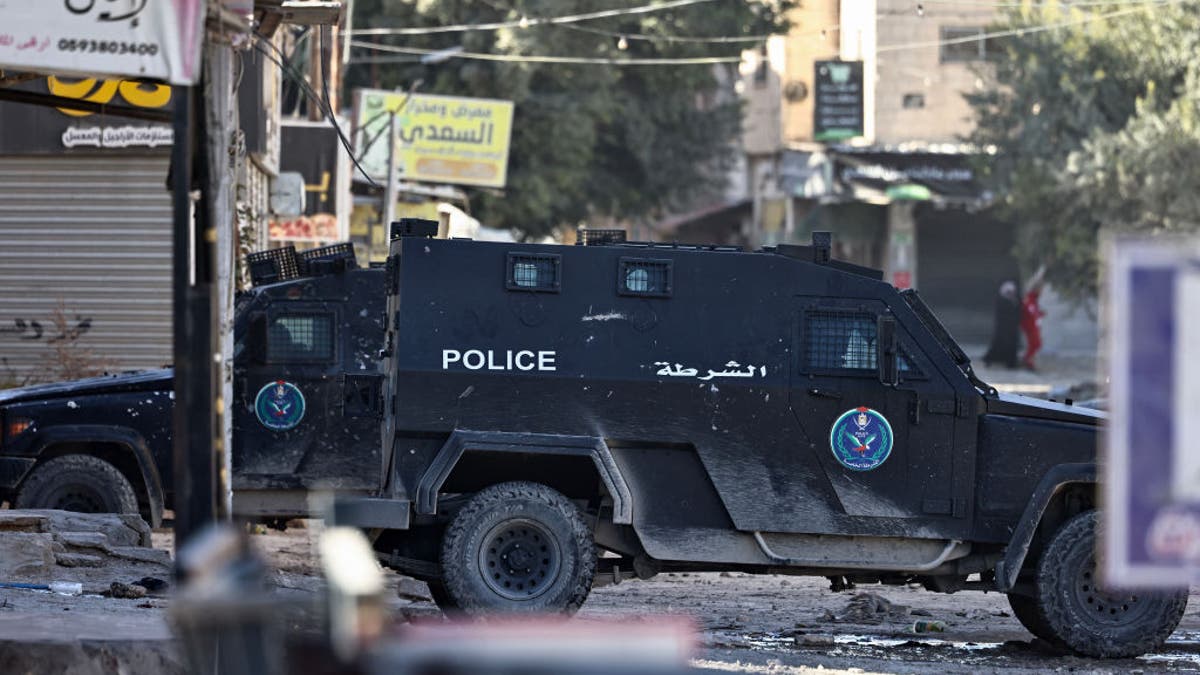
Palestinian Authority security forces vehicles block a road amid clashes with militants in the Jenin camp in the Israel-occupied West Bank on Dec. 15, 2024. For more than a week, the northern West Bank city of Jenin has seen intense violence, after the PA, which coordinates security matters with Israel, arrested several militants. (ZAIN JAAFAR/AFP via Getty Images)
“There’s no active fighting right now, but the PA forces are stuck. They’ve tried to enter, but failed, and now they’re stuck outside,” said Daraghmeh. “They can’t leave, but they can’t continue the operation either, because there are dozens of militants ready to confront them.”
Milshtein, the former head of Palestinian affairs in Israeli Defense Forces military intelligence, told Fox News Digital, “The PA does not have the ability to enforce control in northern Samaria and the surrounding areas. The PA has lost control of these regions, and for years, Israel has treated Jenin and the surrounding areas like Gaza- without PA control mechanisms, and essentially, there’s a real vacuum.”
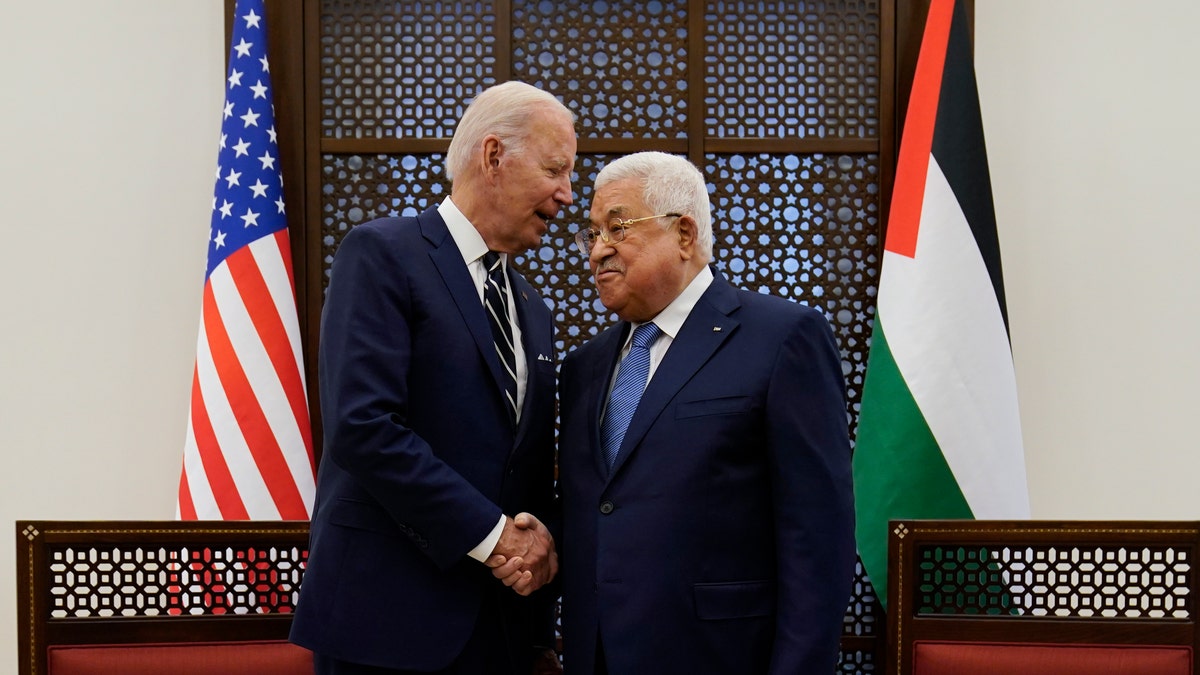
Palestinian President Mahmoud Abbas, right, and President Biden shake hands in the West Bank town of Bethlehem on Friday, July 15, 2022. (AP Photo/Evan Vucci)
The timing of the PA’s operation is significant, with many observers noting that it coincides with the broader regional context, including the ongoing war in Gaza and the fall of Syrian President Bashar al-Assad. Milshtein believes that the events in Syria played a role in the PA’s decision to act. “People in the West Bank say that when one dictator (PA President Mahmoud Abbas) saw what happened to the other (Bashar al-Assad), he decided he would not follow the same fate,” Milshtein explained. “Mahmoud Abbas likely felt that he needed to act before the PA’s authority in the West Bank completely erodes.”
The operation, which is part of a larger crackdown in the northern West Bank, also reflects the PA’s desire to assert itself as a capable authority ahead of potential political developments in Gaza. The PA has long struggled with its ability to govern Gaza, which it lost to Hamas in 2007. Now, with the region in turmoil, it is hoping to prove that it can restore order in the West Bank, which it argues will bolster its legitimacy in any postwar political scenario for Gaza.
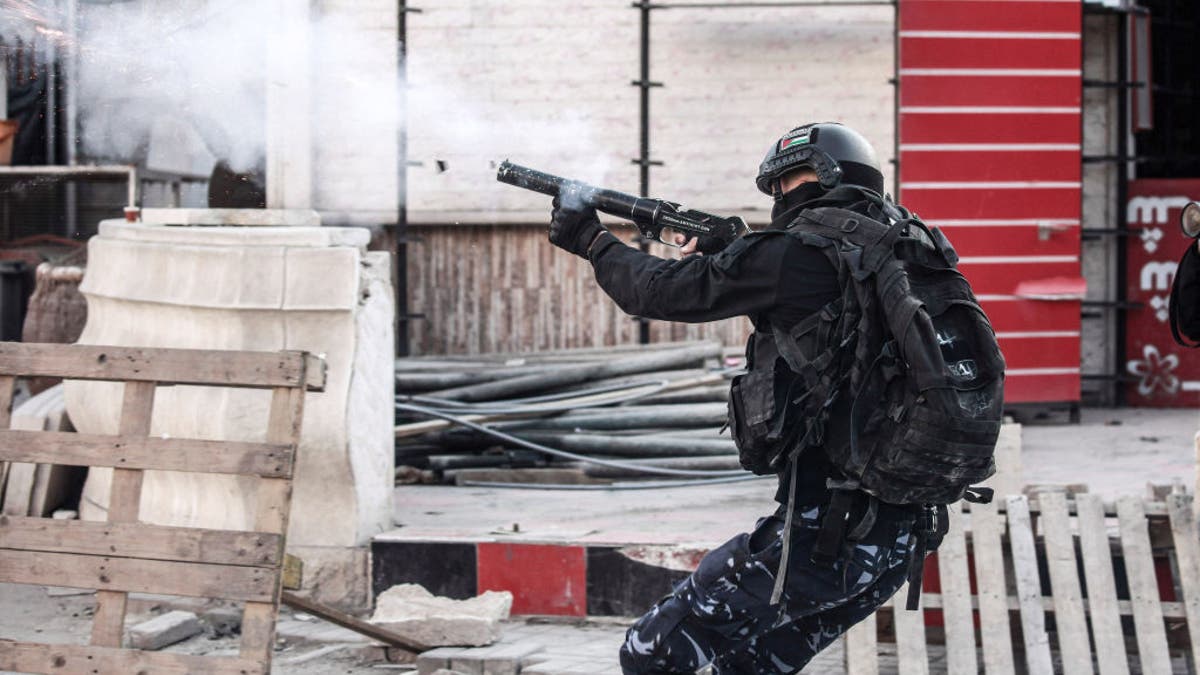
A Palestinian security man fires tear gas at protesters in the center of the West Bank city of Jenin and its camp on Dec. 16, 2024. (Nasser Ishtayeh/SOPA Images/LightRocket via Getty Images)
“I don’t see a possibility that the PA will control Gaza,” Milshtein said, “There are two million people there. For 17 years, they have been ruled by Hamas, and 60% were born after Hamas took control. They were educated to view the PA as collaborators with Israel and enemies. Giving the PA two hours in Gaza is a known failure from the outset.”
Despite the violence in Jenin, Daraghmeh does not foresee the conflict spreading beyond. “People in Ramallah, Hebron and other cities don’t want the West Bank to turn into another Gaza,” Daraghmeh said. “The situation in Jenin is contained, but it remains a test for the PA’s ability to control its own territory.”
World
Can toppled Syrian president Bashar al-Assad be brought to justice?
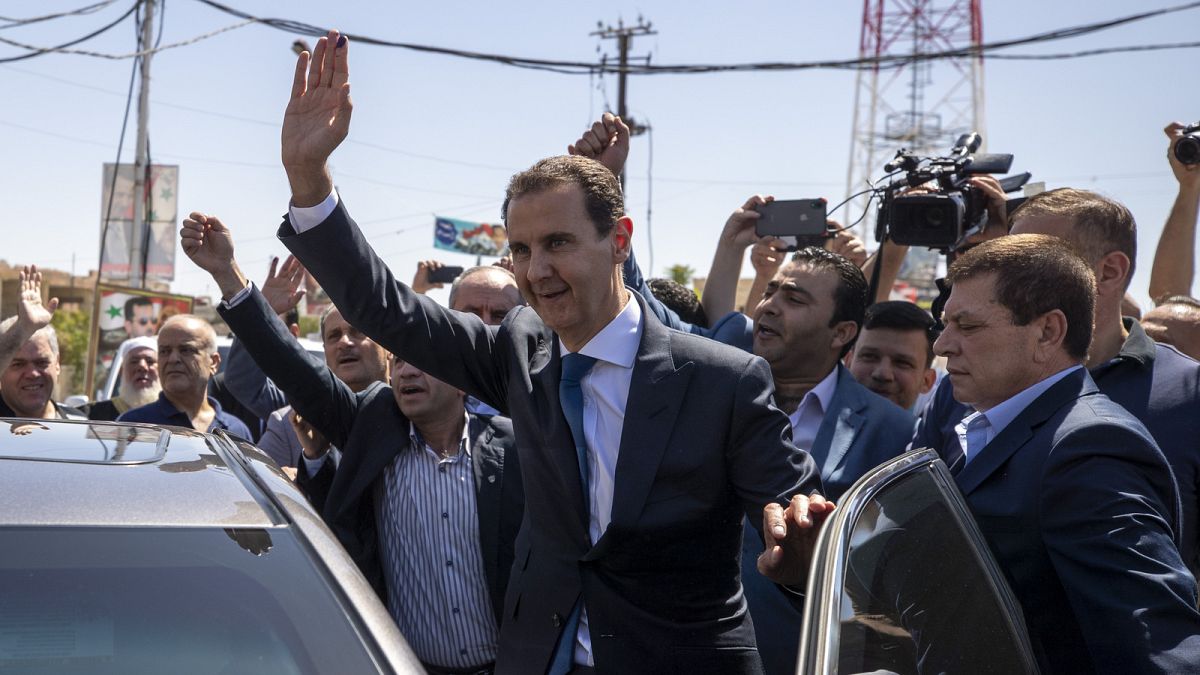
Despite the legal and political barriers to prosecution, human rights experts are optimistic that al-Assad and regime officials could one day be held accountable for their crimes in a court of law.
In Syria, celebrations of the fall of Bashar al-Assad have been mingled with a sense of horror, as gruesome evidence of the atrocities committed by his regime emerge.
Mass graveyards and the infamous prisons that were central to the deposed dictator’s coercive rule have been uncovered.
They bear traces of the brutal suffering inflicted by the regime.
Chaotic scenes of former detainees, their relatives and journalists trawling through paperwork in the detention centres have sparked international pleas on Syria’s new de facto leaders to ensure evidence is preserved for future criminal prosecutions.
Al-Assad and his father, Hafez, have been accused of a litany of crimes and abuses over the past 54 years, including torture, rape, mass executions, enforced disappearances and chemical attacks.
The Syrian Network for Human Rights (SNHR) estimates that at least 15,000 Syrians have been tortured to death since the civil war broke out in 2011.
But with al-Assad in exile in Russia and many of his entourage suspected to be in Iran, there are several legal and political obstacles that stand in the way of criminal accountability.
The Hague-based International Criminal Court (ICC) is the most obvious international court of law for prosecuting individuals for such serious crimes. But the ICC does not have jurisdiction over Syria as the country is not a state party to the court’s treaty, the Treaty of Rome.
The UN Security Council can in principle refer a case to the ICC, granting it jurisdiction. But that would certainly be vetoed by the Kremlin, given its alliance with al-Assad and its own complicity in the crimes.
Both Russia and China blocked such a referral ten years ago.
Speaking to Euronews, Balkees Jarrah, associate director for international justice at Human Rights Watch (HRW) called on Syria’s new de facto authorities to consider granting jurisdiction to the ICC: “We believe Syria’s new leadership should immediately make clear its commitment to justice and accountability,” she said.
“This includes ratifying the Rome Treaty and giving the International Criminal Court retroactive jurisdiction so that the prosecutor can examine crimes committed over the last years.”
All eyes on de facto Syrian leaders
A more viable option in the current political climate is for trials to be held in criminal courts both within and outside Syria.
Experts say it’s too soon to tell whether the new de facto rulers will be able to ensure any Syrian criminal proceedings are carried out safely and in line with international standards.
“We don’t know what the future state of Syria will look like, how the different institutions will work and how well they will cooperate with each other. So this is just something we cannot predict,” according to Elisabeth Hoffberger-Pippan of the Leibniz Peace Research Institute Frankfurt (PRIF).
“The ideal option is to have criminal proceedings in Syria itself that meet fair trial standards, without use of the death penalty. And there is a need to ensure the safety for witnesses and victims to come forward with testimonies,” Vito Todeschini, legal advisor for Amnesty International, told Euronews.
The main rebel group in the new administration is the Hayat Tahrir al-Sham (HTS), designated a terrorist group by the UN Security Council and formerly linked to al-Qaeda.
Its leader, Ahmed al-Sharaa, formerly known as Abu Mohammed al-Jolan, has vowed to “pursue” the regime’s henchmen in Syria and has called on countries to “hand over those who fled” so that justice can be served.
The rebel fighters have also spoken of an amnesty for all military personnel conscripted into service under al-Assad.
But it is currently inconceivable for al-Assad himself to be extradited to stand trial in either a Syrian or non-Syrian court, as there is no political appetite or motive for Moscow to hand him over. Iran is also unlikely to extradite regime officials who have fled there.
Yet, experts consulted by Euronews have expressed hope that al-Assad and the regime’s high-level torturers can one day be held accountable, if the geopolitical conditions change.
“If the sudden fall of the al-Assad regime has shown us anything it is that things can change quite rapidly,” Human Rights Watch’s Jarrah said. “We can’t predict what happens in the future nor preclude the possibility of Assad answering for his crimes one day in a court of law.”
“What we also need to consider right now is how intense and how strong the bond is between Vladimir Putin and Bashar al-Assad,” Hoffberger-Pippan of PRIF said. “I do think that there is a chance Russia might not be as interested in al-Assad in the future because the geopolitical environment is changing in a way that makes it less important for Russia to protect him.”
Calls for international collaboration and preservation of evidence
Universal jurisdiction also allows non-Syrian courts to prosecute Syrians for crimes against humanity, war crimes, and torture.
Criminal cases against regime officials have already been filed in Austrian, French, German, Norwegian, Swedish and US courts, many of which have already successfully pressed charges.
The first international trial on torture in Syria was heard before the Koblenz Higher Regional Court in Germany in 2020. Two former high-level officials of the al-Assad regime were charged, one of whom was found guilty of crimes against humanity and handed a life-long sentence.
In November 2023, a French court issued international arrest warrants for Bashar al-Assad, his brother and two officials over an attack against civilians using chemical weapons in 2013.
According to the Berlin-based European Center for Constitutional and Human Rights (ECCHR), universal jurisdiction carries promise but should be a “fall-back option” if processes within Syria fail.
The push towards justice should be “Syrian-led”, it says.
For any trials, well-preserved evidence is crucial.
During the decades-long regime, offenses were documented by international organisations and Syrian civil society with the help of whistleblowers. The so-called ‘Caesar’ photos, taken by a Syrian military police officer who defected a decade ago, are perhaps the most well-known evidence of torture which has led to criminal proceedings in European courts.
The UN’s International, Impartial and Independent Mechanism (IIIM) has a mandate to collect, preserve and analyse evidence to be used in criminal proceedings and supports Syrian civil society in judicial processes.
Its lead investigator Robert Petit has described “papers strewn all over the floor, people leaving with computers, hard drives burned and smashed” in regime centres during the rebels’ offensive.
“Those in control of these prisons need to safeguard materials in these facilities so that the truth can be told and so that those responsible are held accountable,” HRW’s Jarrah explained.
Euronews reached out to the UN to ask whether its investigators have yet been authorised by Syria’s de facto leaders to gain access to the ground, but has not yet received a reply.
According to the ECHHR, there is also real risk that evidence can be confiscated “to be used as political or commercial capital” or be compromised by secret services agents from countries “interested in destroying evidence and archives.”
-

 Business1 week ago
Business1 week agoOpenAI's controversial Sora is finally launching today. Will it truly disrupt Hollywood?
-

 Politics6 days ago
Politics6 days agoCanadian premier threatens to cut off energy imports to US if Trump imposes tariff on country
-
/cdn.vox-cdn.com/uploads/chorus_asset/file/25782636/247422_ChatGPT_anniversary_CVirginia.jpg)
/cdn.vox-cdn.com/uploads/chorus_asset/file/25782636/247422_ChatGPT_anniversary_CVirginia.jpg) Technology1 week ago
Technology1 week agoInside the launch — and future — of ChatGPT
-
/cdn.vox-cdn.com/uploads/chorus_asset/file/25789444/1258459915.jpg)
/cdn.vox-cdn.com/uploads/chorus_asset/file/25789444/1258459915.jpg) Technology5 days ago
Technology5 days agoOpenAI cofounder Ilya Sutskever says the way AI is built is about to change
-

 Politics5 days ago
Politics5 days agoU.S. Supreme Court will decide if oil industry may sue to block California's zero-emissions goal
-
/cdn.vox-cdn.com/uploads/chorus_asset/file/25546252/STK169_Mark_Zuckerburg_CVIRGINIA_D.jpg)
/cdn.vox-cdn.com/uploads/chorus_asset/file/25546252/STK169_Mark_Zuckerburg_CVIRGINIA_D.jpg) Technology5 days ago
Technology5 days agoMeta asks the US government to block OpenAI’s switch to a for-profit
-

 Politics7 days ago
Politics7 days agoConservative group debuts major ad buy in key senators' states as 'soft appeal' for Hegseth, Gabbard, Patel
-

 Business4 days ago
Business4 days agoFreddie Freeman's World Series walk-off grand slam baseball sells at auction for $1.56 million














